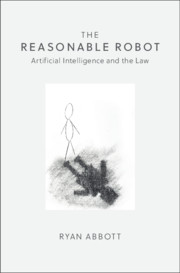Book contents
- The Reasonable Robot
- The Reasonable Robot
- Copyright page
- Dedication
- Contents
- Introduction: Artificial Intelligence and the Law
- 1 Understanding Artificial Intelligence
- 2 Should Artificial Intelligence Pay Taxes?
- 3 Reasonable Robots
- 4 Artificial Inventors
- 5 Everything Is Obvious
- 6 Punishing Artificial Intelligence
- 7 Alternative Perspectives on AI Legal Neutrality
- Third-Party Materials
- Notes
- Index
Introduction: Artificial Intelligence and the Law
Published online by Cambridge University Press: 15 June 2020
- The Reasonable Robot
- The Reasonable Robot
- Copyright page
- Dedication
- Contents
- Introduction: Artificial Intelligence and the Law
- 1 Understanding Artificial Intelligence
- 2 Should Artificial Intelligence Pay Taxes?
- 3 Reasonable Robots
- 4 Artificial Inventors
- 5 Everything Is Obvious
- 6 Punishing Artificial Intelligence
- 7 Alternative Perspectives on AI Legal Neutrality
- Third-Party Materials
- Notes
- Index
Summary
This chapter explains the need for AI legal neutrality and discusses its benefits and limitations. It then provides an overview of its application in tax, tort, intellectual property, and criminal law. Law is vitally important to the development of AI, and AI will have a transformative effect on the law given that many legal rules are based on standards of human behavior that will be automated. As AI increasingly steps into the shoes of people, it will need to be treated more like a person, and more importantly, sometimes people will need to be treated more like AI.
Keywords
- Type
- Chapter
- Information
- The Reasonable RobotArtificial Intelligence and the Law, pp. 1 - 17Publisher: Cambridge University PressPrint publication year: 2020
- 3
- Cited by

